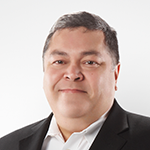It is 12 a.m., and Julio Romero Agüero is finally off the clock. For the last three weeks, this has been his new quitting time. Seventeen hours earlier, he reported for work at Empresa Nacional de Energía Eléctrica, the national electric company for Honduras. For the last three weeks, it has been Agüero’s responsibility to lead electrical restoration activities in the southern region of Honduras after the hand of Hurricane Mitch nearly wiped the country from the map. Fifty years of development, said its president, Carlos Flores Facusse, were lost in three days. Agüero is only 24, but in the last three weeks, he’s grown up very fast.
Agüero had already grown up in Honduras and Nicaragua in the traditional sense. Fond memories of his grandmother—a schoolteacher for most of her life—teaching him elementary math and how to read and write, of his parents and the many gifts they bought their son like atlases and encyclopedias, paint the picture of his childhood. “I remember for my entire life,” Agüero recalls, “education has been very important to my family.” His free time as a boy was spent staring down the barrel of a microscope his father bought him, which became one of his most prized possessions.
In September of 1998, the science prodigy could stand on any worksite, look in any direction, and stare at unprecedented in damage. Two years out of college, more than 150 people looked to him for leadership in restoring arguably the most vital resource to a disaster-dazed area, save for food and water. This was not the first time Agüero had so proven himself. Before earning the title of advisor for the regional systems department (where he was responsible for the southern, central, and eastern regions of the country) for the national electric company, Agüero was a fresh-faced and ambitious intern. After just six months, his boss offered him a position managing nearly 100 people—many of them old enough to be Agüero’s father, or even grandfather—at a regional office. “I think he liked that I took initiative,” Agüero says. “I thought of myself as an up-and-comer, someone who would continue to seize opportunities.”
After helping his department through Mitch, Agüero’s next opportunity came in Tegucigalpa, the capital of Honduras, where he would be in charge of distribution operations for the electric company. He accepted the challenge, and shortly after, added another. In what he describes as one of the best decisions of his life, Agüero decided to pursue his PhD in electrical engineering at the Universidad Nacional de San Juan, Argentina. “I noticed what was only an incipient trend at that time: the growing utilization of real-time computing, communications, and control technologies in power distribution systems—what we now know as Smart Grid,” he explains, “and I knew I needed to learn more about it to do my job as best as I could.”
With an advanced degree Agüero returned to Honduras and joined the National Energy Commission of Honduras, the regulatory board of the country’s power sector. Later, in his role as commissioner, he continued to develop the “soft skills” he practiced in his former leadership roles. Managing multidisciplinary teams while juggling and meeting the many expectations of multiple stakeholders would be integral to his success in the next 5 to 10 years, but it was exactly at that point in the future that Agüero couldn’t visualize himself in Honduras any longer. “I was enjoying my job,” Agüero says, but “I’ve always asked myself where I will go next, and I realized if I left the Commission, there wouldn’t be many options left for me in Honduras. I decided to go somewhere where I could continue growing and where the roof would be higher.”
In the United States, the roof is definitely higher. As a consultant for the power utility infrastructure consulting company, Quanta Technology, in Raleigh, North Carolina, his work takes him around the United States and overseas, giving Agüero the opportunity to immerse himself in what he calls the different realities of this multiregional market. While critical customers in large metropolitan areas demand high reliability infrastructure, those in rural areas may be more forgiving regarding service interruptions. And the environment, which changes from coastal to mountainous more than once across the service territory of Quanta’s clients, affects the problems Agüero solves for his customers, as well as the solutions he develops to serve them.
The company as a whole is another client for Agüero, who says he is most proud to contribute to Quanta by identifying new and profitable lines of business and positioning the company as a leader in the industry. As director of the distribution business area, Agüero has seen the rapid progression toward renewable energy and Smart Grid technology, trends he has coauthored research on with his colleagues. When clients call Quanta for help, they are often looking for answers to problems in emerging fields such as those, and for Agüero to have the chance to develop solutions and contribute to the advancement of this field has been the perfect professional match.
“When I finish a consulting job and the customer is happy and satisfied,” he says, “that is one of my proudest moments. And at Quanta, I have the chance to do that every day.”

